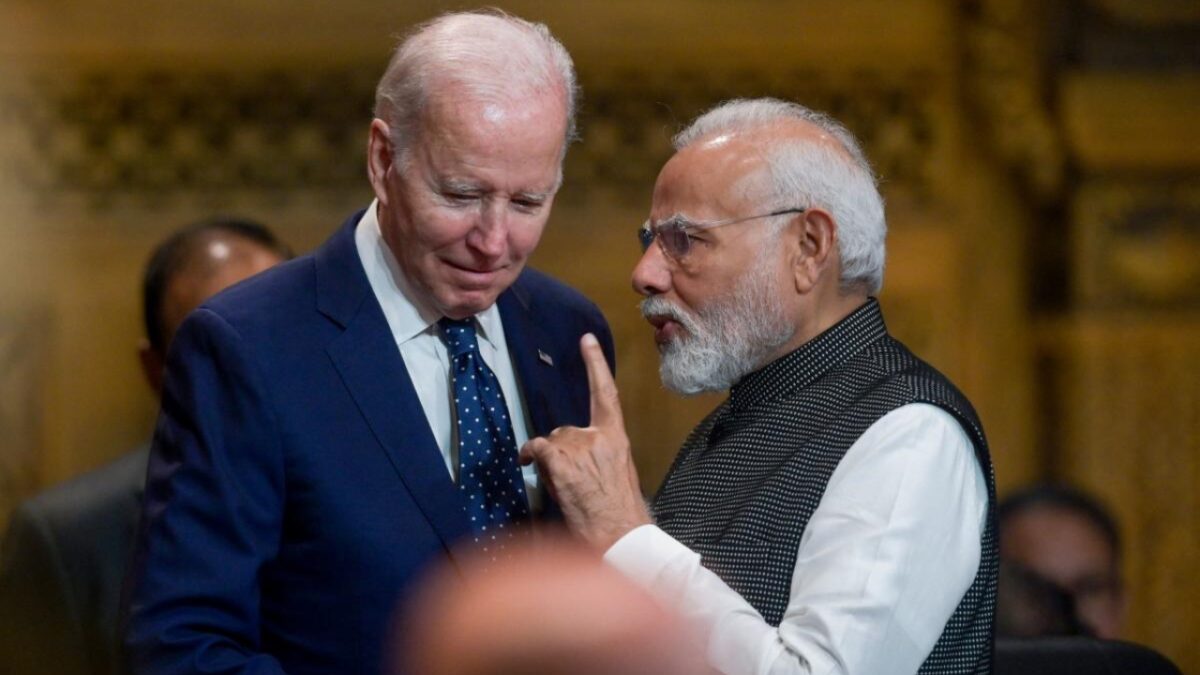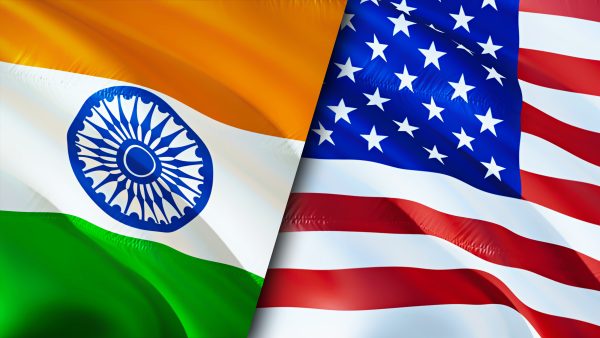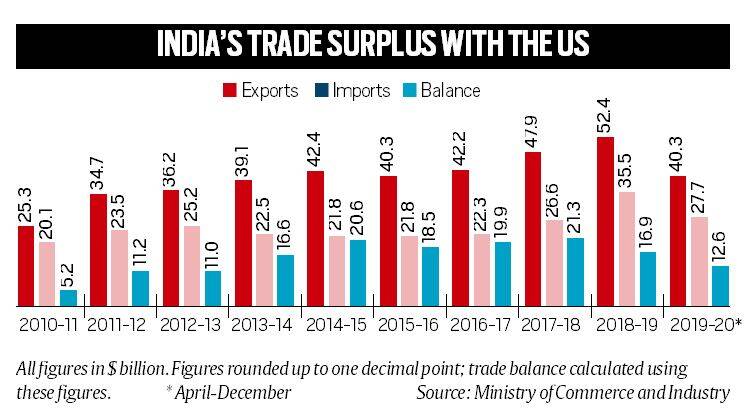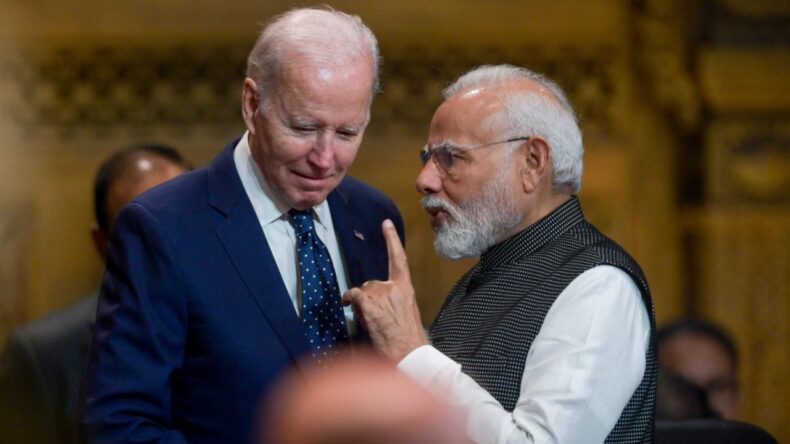The president, who said that the most important fight right now is between democracy and autocracy, realized that he needs to be friends with some people who aren’t perfect but are still important.

According to President Biden, “the battle between democracy and autocracy” is the most important battle of his time. However, Mr Biden will effectively declare a temporary truce when he rolls out the red carpet for India’s Prime Minister Narendra Modi on the South Lawn of the White House on Thursday morning.
Mr Biden will lavish attention on a leader presiding over democratic backsliding in the world’s most populous nation by granting Mr Modi a coveted state visit that includes a star-studded gala dinner. Fears of an authoritarian turn have been raised by Mr Modi’s government’s repression of dissent and harassment of opponents in a manner not seen since India’s descent into dictatorship in the 1970s.
However Mr Biden has closed, much as his ancestors did, that he wants India despite worries over common liberties similarly as he accepts he wants Saudi Arabia, the Philippines and different nations that are either by and large dictatorships or don’t squeeze into the class of ideal popular governments. Mr Biden is being forced to accept the flaws of America’s friends during a time of conflict with Russia and China.

Since Mr Biden has been in office for two and a half years, the framework of democracy versus autocracy has become something of a geopolitical shackle for him. It doesn’t allow for many of the subtleties that his foreign policy envisions, but it almost guarantees criticism whenever he meets someone who doesn’t pass the George Washington test. In a world filled with greys, the structure, according to some of his most trusted advisors, is too stark.
“Any time a president spruces up his international strategy in the language of values, any admission to international reality unavoidably evokes cries of false reverence,” said Hal Brands, a teacher of worldwide issues at the Johns Hopkins College School of Cutting Edge Global Examinations. ” The fact of the matter is, of course, that every president of the United States, including the ones who were most committed to democracy and human rights, realized that some relationships were just too strategically significant to be held hostage by concerns about democratic values.
For some high-ranking administration officials, the dynamic, which has played out repeatedly, has become an exhausting subject. They claimed that the slogan “democracy” never fully captured a more nuanced strategy that goes well beyond dividing the world into two straightforward camps that oppose one another. Recognizing the global drift toward freedom and the threats posed by more aggressive powers like Russia and China was more important.
In an interview with several reporters on Tuesday, the president’s national security adviser, Jake Sullivan, stated, “From our perspective, it has never been as simple as drawing jerseys.” It has always been about recognizing long-term trends, attempting to steer them in the right direction, and preparing for a more sophisticated strategy for establishing relationships with a variety of nations.
The White House sees the Modi visit as an important opportunity to build a relationship with one of the most important “swing states,” which are powers that haven’t decided which side they are on in Russia’s war with Ukraine. Additionally, officials from the United States see India as one of the safeguards against China’s advance.
Mr Sullivan stated, “We expect this to be a historic visit,” anticipating “a significant number of announcements” regarding agreements regarding, among other things, military sales, technology, supply chains, semiconductors, and energy. I truly believe that this will be one of the most important partnerships of our time.
Mr Sullivan insisted that Mr Biden was not deceiving his obligation to a vote-based system by so generously assisting Mr Modi. He also stated that the president would strategically raise concerns about a majority-rule government and common freedoms. “Attempt to demonstrate where we stand without seeming to be in some way patronizing or addressing another country that has a glad history of sway,” Mr Sullivan stated.
The president will act in this manner without holding the usual joint news conference with numerous visiting pioneers. Since Mr Modi doesn’t even hold news gatherings on his dirt and doesn’t care much about answering questions from American columnists, Indian authorities have opposed their American partners’ efforts to seek such a meeting even though no authority plan has been delivered.
On Wednesday night, Mr Modi will arrive at the White House for a private dinner with Vice President Joe Biden, who is just returning from a three-day trip through California. After that, the president will officially invite Mr Modi on Thursday morning at a grand appearance on the South Yard. The two will meet again at a state dinner at night, the third Mr Biden has held during his administration, following gatherings for the heads of France and South Korea, two of the most populous governments.
Mr Modi shows up because India believes it is making its mark on the world stage and has recently surpassed China as the country with the most people worldwide. India has a young workforce, areas of strength for an industry, a developing customer market, and barely scratched potential as an assembly centre.
Atul Keshap, a former American emissary to New Delhi who is currently serving as the leader of the U.S.-India Business Board, estimates that India’s annual trade with the United States could soon be valued at $500 billion. China, the European Union, and Canada are the only members of that association.

India and the United States of America met many of their objectives, but there is still work to be done. Mr Keshap said that we need to do more to improve business-to-business connections. For a strong relationship, this is very important.
Leaders and businesses in the United States are considering whether India could shoulder some of China’s current economic burden. India is showing improvement over different nations due to 6 per cent development. India’s economy is not being affected by the war in Ukraine or inflation. India is beginning to catch the attention of people who buy and sell things.
Happymon Jacob, who teaches Indian foreign policy at the Jawaharlal Nehru University in New Delhi, said, ” The United States and India need each other equally.” In D.C. and other global capitals, India’s position and the power play that followed the Ukraine war emphasized that New Delhi must be engaged and cannot be pushed around. India has emerged as an indispensable power for the United States.
This implies that something has made it hard to perceive how the Indian majority rules government is decreasing under Mr Modi has been in power for the beyond nine years. Individuals who look after the majority rules system have given India lower evaluations. They claim that the leaders of India are gaining an excessive amount of power.
Additionally, India is the most frequent nation in the world to disconnect from the internet during protests. Leaders who oppose the government are frequently searched by investigation teams and confronted with legal issues.
A significant opposition leader, Rahul Gandhi, was expelled from Parliament. Because he was accused of disparaging Modi, he is now attempting to avoid jail.
The prime minister doesn’t want to talk about any of it with Mr Biden because he thinks the issues are internal and not Washington’s business. In the same way that Vice President Biden has reneged on his promise to make Saudi Arabia a “pariah” and is instead courting Crown Prince Mohammed bin Salman, he intends to emphasize points of agreement with Mr Modi over the next few days rather than disagreements.
Mr Jacob stated that India is “sending a message to the United States that it needs to choose between preaching to India or engaging India.” I believe the United States has realized that if it chooses to criticize India, it would sacrifice the geopolitical value of the Indo-US relationship.













